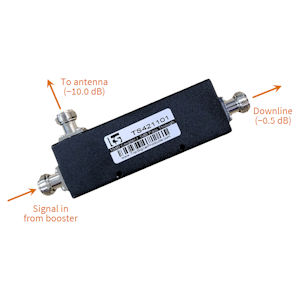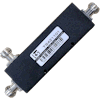Product Description
This product has been discontinued and replaced by the
TS422101.
Features of the Top Signal −10/−0.5 dB 50‑ohm coupler
- One N‑female input, two N‑female outputs.
- 600–2500 MHz frequency range.
- 50 ohm impedance.
- Attenuates −10 dB to the coupler, −0.5 dB to the passthru.
 This Top Signal coupler attenuates −10.0 dB to the antenna and −0.5 dB downline. (Click to enlarge.)
This Top Signal coupler attenuates −10.0 dB to the antenna and −0.5 dB downline. (Click to enlarge.)
How the Top Signal −10/−0.5 dB 50‑ohm coupler is used
- Splits a single run of coax cable differentially, with the −10 dB coupler running to an inside antenna, and the −0.5 dB passthru running farther downline to other antennas, couplers, or splitters.
- For in-building use with 50-ohm cell signal booster systems and ½‑inch, 400, or 240 coax cable terminated with N-male connectors.
Top Signal −10/−0.5 dB 50‑ohm coupler contents
 −10/−0.5 dB N‑female 50‑ohm coupler TS421101
−10/−0.5 dB N‑female 50‑ohm coupler TS421101
Please note
- Because of the signal loss (attenuation) involved, we recommend using a coupler only if you have strong outside signal.
- Users with weak outside signal should consider purchasing multiple, independent cell phone signal booster systems instead of dividing the signal from a single booster.
Product Specifications
Splits Signal:
2 ways
Input Ports:
1
Output Ports:
2
Connector Type:
N-female
Cable Type:
240, 400 & ½-inch coax
Frequency Range:
600–2700 MHz
Impedance:
50 Ω
Gain/Loss:
−10.0 dB coupler / −0.5 dB passthru
Warranty Information
For warranty information on this product, please see our Top Signal warranty information page.

